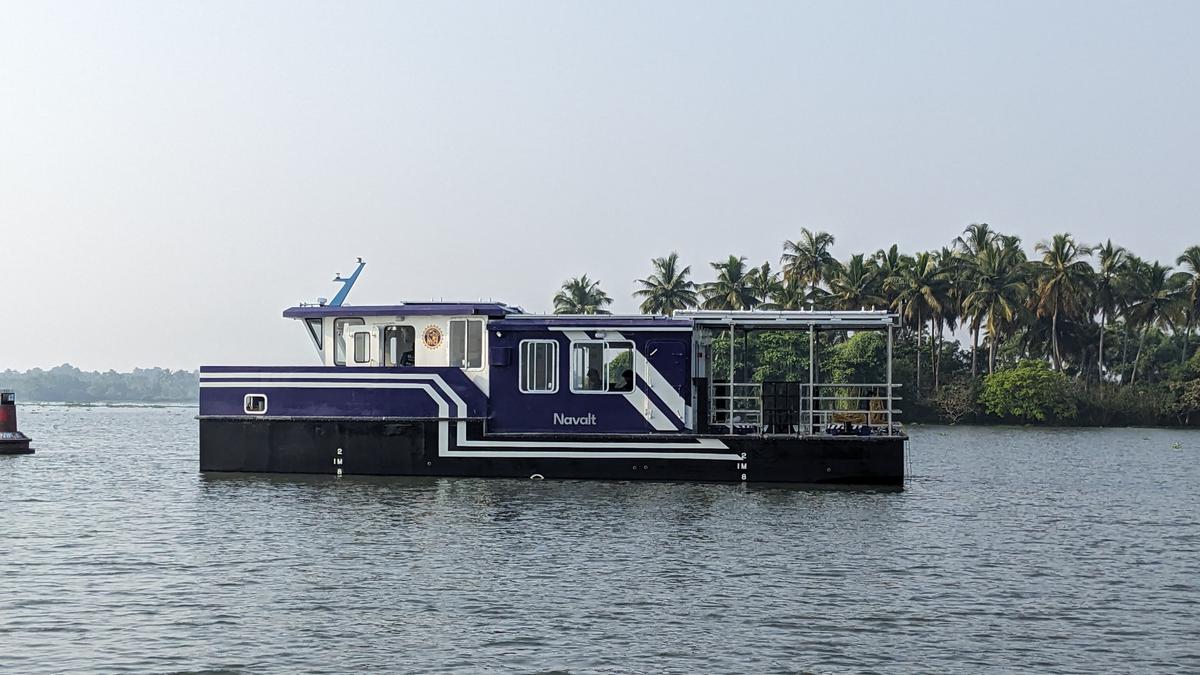
‘India’s fastest’ solar-electric boat Barracuda launched
The Hindu
India's fastest solar-electric boat, Barracuda, launched to promote eco-friendly maritime transportation.
Taking ahead the cause of eco-friendly maritime transportation, Barracuda, said to be India’s fastest solar-electric boat, was launched on Wednesday at the yard of Navalt Solar and Electric Boats, located off Aroor in Alappuzha.
Named after the swift, long fish, Barracuda was designed by Navalt and can be deployed even in the rough seas as a workboat to ferry up to 12 passengers and cargo. The 14-metre-long, 4.4-metre-wide vessel can attain a top speed of 12.5 knots (23 kmph) and has a range of seven hours on a single charge. It has twin 50 kW electric motors, a marine-grade LFP battery, and 6 kW solar power, epitomising efficient and clean energy usage, says a release issued by Navalt.
Sanjay Kumar Singh, general manager, Mazagon Dock Limited, for whom the vessel was built, was among those who were present at the launch. Mazagon Dock will introduce the eco-friendly vessel at its Mumbai dock.
It is engineered to navigate through waves as tall as four metres and operates without noise, vibration and air pollution.
“We would continue to contribute towards a cleaner and quieter ocean, for which such boats would provide affordable substitutes for conventional fossil-fuelled boats,” said Sandith Thandasherry, managing director, Navalt Solar and Electric Boats. It won the world’s best start-up award in the mobility and transportation category at the Berlin Start-up Energy Transition Awards 2023. The firm that operates from Kochi has also received various prestigious awards, including the Gustave Trouve Awards twice.

Hampi, the UNESCO-recognised historical site, was the capital of the Vijayanagara empire from 1336 to 1565. Foreign travellers from Persia, Europe and other parts of the world have chronicled the wealth of the place and the unique cultural mores of this kingdom built on the banks of the Tungabhadra river. There are fine descriptions to be found of its temples, farms, markets and trading links, remnants of which one can see in the ruins now. The Literature, architecture of this era continue inspire awe.

Unfurling the zine handed to us at the start of the walk, we use brightly-coloured markers to draw squiggly cables across the page, starting from a sepia-toned vintage photograph of the telegraph office. Iz, who goes by the pronouns they/them, explains, “This building is still standing, though it shut down in 2013,” they say, pointing out that telegraphy, which started in Bengaluru in 1854, was an instrument of colonial power and control. “The British colonised lands via telegraph cables, something known as the All Red Line.”

The festival in Bengaluru is happening at various locations, including ATREE in Jakkur, Bangalore Creative Circus in Yeshwantpur, Courtyard Koota in Kengeri, and Medai the Stage in Koramangala. The festival will also take place in various cities across Karnataka including Tumakuru, Ramanagara, Mandya, Kolar, Chikkaballapura, Hassan, Chitradurga, Davangere, Chamarajanagar and Mysuru.








